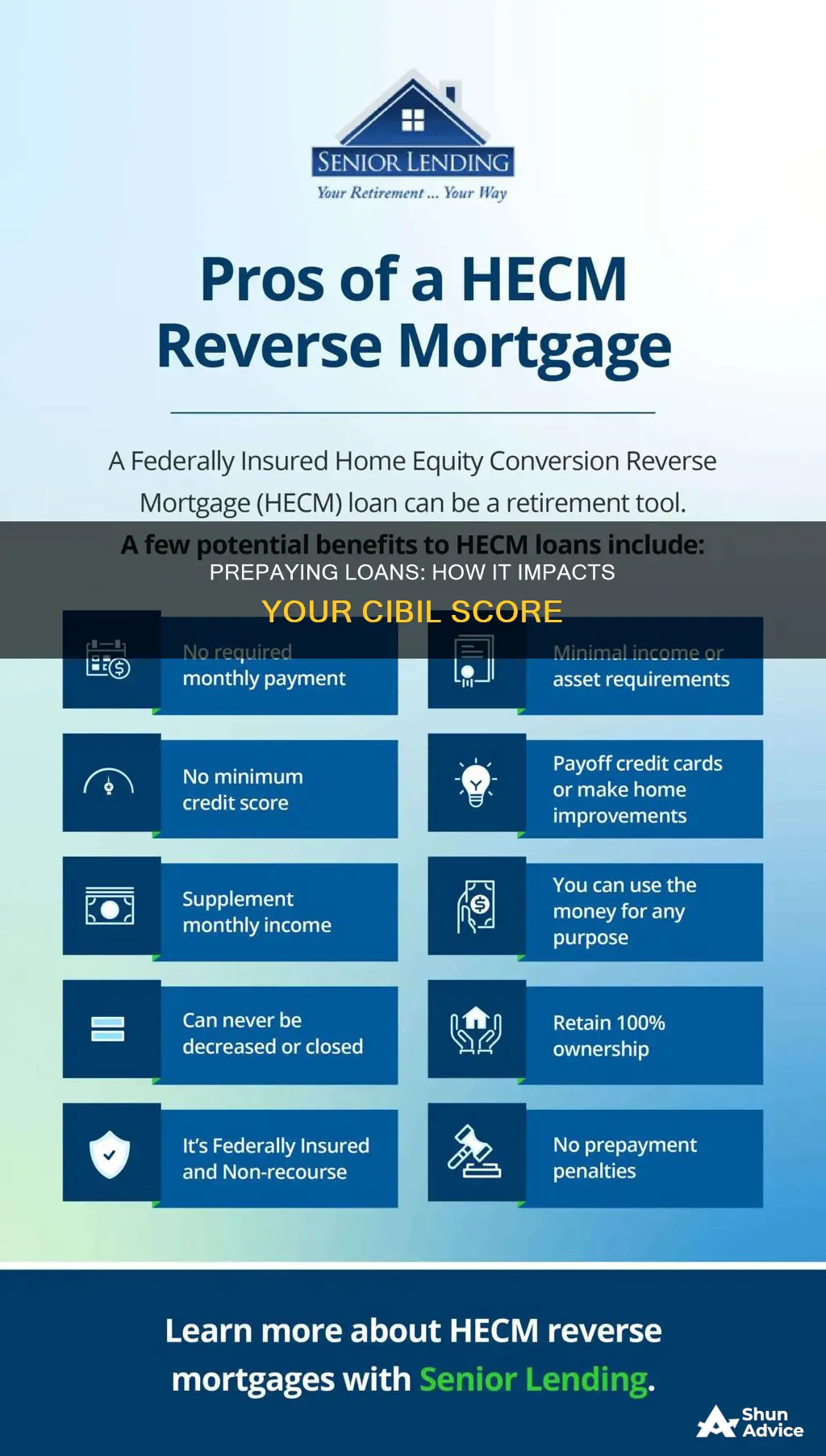
Prepayment or foreclosure of a loan is when a borrower pays off their entire loan balance in one lump sum before its due date. This can reduce the borrower's debt-to-income ratio and increase their eligibility to avail of more loans. However, it is important to note that prepayment may not always be the best option for borrowers due to potential prepayment penalties and the risk of exhausting one's savings. So, does prepayment of a loan affect one's CIBIL score?
| Characteristics | Values |
|---|---|
| Does prepayment of loan affect CIBIL score? | No, prepayment does not negatively impact your CIBIL score. |
| Does prepayment of loan affect credit score? | Prepayment of a loan can have a marginal positive or negative impact on your credit score. |
| What are the advantages of prepayment? | Prepayment can save you interest costs, improve your credit score, free up cash flow, and increase your eligibility to avail more loans. |
| What are the disadvantages of prepayment? | Prepayment can incur foreclosure charges, and it is generally not advisable to spend all your savings on prepayment. |
What You'll Learn

Prepayment of a personal loan can reduce your debt-to-income ratio
Prepaying your personal loan in full can have a positive impact on your credit score in the long run. This is because you have successfully paid off the loan before the stipulated time. However, prepayment or foreclosure may lead to certain fees, so it is important to understand the terms and conditions of closing a personal loan in advance.
Your debt-to-income (DTI) ratio is a comparison of your income to your current debt load. It is a critical measurement of your creditworthiness in the eyes of lenders and plays a big factor in how they determine your borrowing risk. When you apply for a personal loan or line of credit, lenders look at more than just your credit history and credit score. They also want to know how much debt you're carrying and if you can comfortably afford to take on more. That's where your DTI comes in.
The DTI ratio does not distinguish between different types of debt and the cost of servicing that debt. Credit cards, for example, carry higher interest rates than student loans, but they are lumped together in the DTI ratio calculation. If you transferred balances from your high-interest credit cards to one with a lower rate, your monthly payments would decrease. As a result, your total monthly debt payments and your DTI ratio would decrease, but your total debt outstanding would remain unchanged.
Prepayment of a personal loan can reduce your DTI ratio since your debt obligations will reduce. This is advantageous if you are planning to take on another loan after prepaying your current one. The lower your DTI, the higher your loan approval chances. So, if you applied for a loan for emergency funds and are now able to repay, you can consider prepayment.
A good DTI varies from lender to lender, but a ratio of 43% is typically the highest one can have to qualify for a mortgage. Mortgage lenders generally prefer a DTI of 36% or less, while for personal loans, a DTI of no higher than 40% is sought. If you've lowered your DTI since you last took out a loan, you may be able to qualify for a lower interest rate through refinancing.
How PMI Adjusts as You Repay Your Loan
You may want to see also

Prepaying a loan will not negatively impact your credit score
Additionally, prepaying a loan can save you money on interest payments. By prepaying a loan, you can avoid paying interest on the remaining tenure of the loan. This can be especially advantageous when market interest rates are low, as you can prepay your current loan and then take out a new loan at a lower interest rate.
However, it is important to note that prepaying a loan may come with certain fees and charges. Lenders may impose prepayment penalties, so it is important to understand the terms and conditions of closing a loan early. It is also generally not advisable to exhaust your savings to prepay a loan early, as unexpected expenses may arise, and you may need your savings to deal with these immediate needs.
Overall, while prepaying a loan will not negatively impact your credit score, it is important to carefully consider your financial situation and assess the gains from prepaying the loan before making a decision.
Loan Pre-Closure: Impact on Your CIBIL Score and Report
You may want to see also

Prepayment can save you interest costs
However, it's important to consider the prepayment penalties and fees that may be associated with early repayment. Some lenders charge a penalty fee for paying off a loan before the due date. These fees can sometimes cancel out the interest savings, so it's essential to do the calculations beforehand to determine if prepayment is financially beneficial.
Additionally, prepaying a loan can have a small impact on your credit score. While it won't directly lower your score, it may affect the algorithm that calculates your score by reducing your debt-to-income ratio. This can be advantageous if you plan to take out another loan, as a lower debt-to-income ratio improves your chances of loan approval.
It's also worth noting that part-payments can help reduce the outstanding loan amount, which in turn lowers the interest paid. However, part-payments only work when you pay a lump sum, and not all banks allow them. It's crucial to understand the foreclosure rules and regulations of your loan before making any decisions.
In conclusion, prepaying your loan can save you interest costs, but it's important to consider the potential fees and how it may impact your credit score. Assessing your financial situation and doing the necessary calculations will help you determine if prepayment is the right choice for you.
Title Loans: PLS Offers Easy Financing Options
You may want to see also

Lenders may charge prepayment penalties
Prepayment or foreclosure of a loan does not negatively impact your CIBIL score. However, lenders may charge prepayment penalties, which can vary depending on the lender's policies. These charges can range from 2% to 5% of the loan amount and are typically imposed when the borrower repays the loan before the set tenure or due date.
It is important to understand the terms and conditions of closing a loan in advance, as prepayment penalties can affect the overall financial situation. Some lenders may have a lock-in period, usually around one year, during which prepayment is not allowed or may incur a higher penalty.
When deciding whether to prepay a loan, it is essential to consider the interest rate on the loan, the remaining tenure, and the prepayment penalty. While prepaying a loan can save on interest costs, especially in a high-interest-rate environment, the prepayment charges may outweigh the interest savings. Therefore, borrowers should carefully assess their financial situation and do the necessary calculations before choosing to prepay their loans.
Additionally, borrowers should be aware that their savings may be impacted by unexpected expenses. Thus, it is generally not advisable to spend all savings on foreclosing a loan early. Instead, it is recommended to have sufficient funds to pay off the loan without compromising emergency savings or other financial goals.
In summary, while prepayment of a loan does not negatively affect the CIBIL score, lenders may charge prepayment penalties that borrowers should carefully consider before taking action.
Exploring 401(k) Loan Options with One America
You may want to see also

Prepayment can increase your eligibility to avail more loans
Prepayment of a loan can increase your eligibility to avail of more loans in the future. This is because prepayment can improve your credit score and reduce your debt-to-income (DTI) ratio. A good credit score can help you secure lower interest rates on future loans and credit cards.
When you prepay a loan, you may have to pay a prepayment fee, which is typically nominal. This fee is a small price to pay to be free of debt before the end of the loan repayment tenure. Prepayment can also help you save on interest costs, as the interest paid is calculated based on the outstanding loan amount. By prepaying the loan, you reduce the outstanding amount and, therefore, the interest paid over time.
It is important to note that prepayment of a loan may not always be the best option. It is generally not advisable to spend all your savings on prepaying a loan early, as unexpected expenses may arise. Additionally, some loans may have restrictions on prepayment, and there may be prepayment penalties or fees involved. It is important to understand the terms and conditions of the loan before making any prepayments.
Before considering prepayment, it is essential to ensure that you have sufficient funds for your financial goals and emergency requirements. You should also compare the cost of prepayment with the returns that can be earned from investments. If you have the opportunity to earn returns that are higher than the loan interest rate, it may be more beneficial to invest your surplus funds rather than use them to prepay the loan.
Overall, prepayment of a loan can increase your eligibility for future loans by improving your credit score and reducing your DTI ratio. However, it is important to carefully consider your financial situation and the terms and conditions of the loan before making any prepayments.
PHH Construction Loans: What You Need to Know
You may want to see also
Frequently asked questions
Prepayment of a loan does not negatively affect your CIBIL score. In fact, it can increase your credit score and improve your eligibility to avail more loans.
Prepayment of a loan reduces your debt-to-income ratio, a key metric lenders look at before sanctioning a loan. This means you are more likely to be approved for future loans.
You should consider the interest rate on the loan, the remaining tenure of the loan, and the pre-payment penalty. It is generally not advisable to spend all your savings on prepaying your loan early as unexpected expenses may occur.







